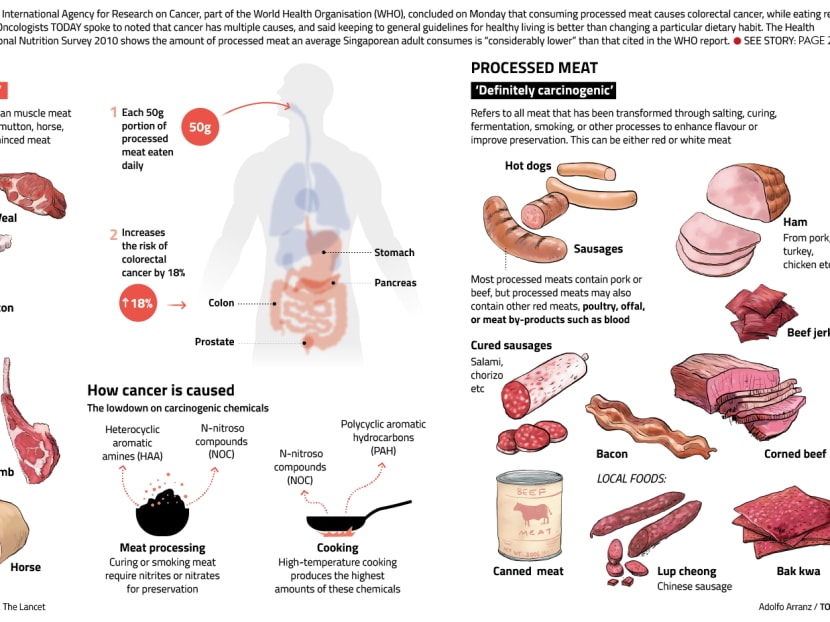How to have your meat and eat it, too
SINGAPORE — Eat as little bacon, ham and other processed meat as possible, and observe general guidelines for healthy living that include not smoking, exercising and eating more fruits and vegetables.

Bacon is fried up in a pan in a kitchen in this photo illustration in Golden, Colorado, on Oct 26, 2015. Photo: Reuters
SINGAPORE — Eat as little bacon, ham and other processed meat as possible, and observe general guidelines for healthy living that include not smoking, exercising and eating more fruits and vegetables.
This was the advice of experts in Singapore, in the wake of a World Health Organization agency saying on Monday (Oct 26) that processed meat causes colorectal cancer. The 22 experts from the International Agency for Research on Cancer (IARC) also said red meat probably causes cancer.
The agency reviewed over 800 studies before concluding that each 50-gram portion of processed meat eaten daily increases the risk of colorectal cancer by 18 per cent. The evidence showing that red meat — which includes beef, pork and mutton — causes colorectal cancer is limited, but red meat has also been linked to pancreatic cancer and prostate cancer.

(Click to enlarge)
While consumption of processed meat should be kept to a minimum where possible, it is important to remember that cancer has multiple causes, said Dr Raymond Ng of the National Cancer Centre Singapore.
“Healthy living means avoiding smoking, eating more fruits and vegetables, exercising and keeping one’s body weight within the ideal range, rather than just specifically changing one particular dietary habit,” said Dr Ng, a senior consultant medical oncologist.
Experts said there are no specific guidelines on how much processed or red meat to eat. “It’s a continuous curve, there is no cut-off beyond which it is safe or dangerous,” said Dr Wong Seng Weng, consultant medical oncologist at The Cancer Centre.
He also felt it was “reasonable to extrapolate” the IARC’s classification of processed meat to other processed meats found in Singapore, such as Chinese sausage and bak kwa (marinated, sliced barbecued pork commonly eaten during Chinese New Year).
“The key is moderation in everything, so having two pieces of bacon once in a while is still acceptable,” said Dr Sue Lo, director and senior consultant oncologist from The Harley Street Heart and Cancer Centre.
According to the National Nutrition Survey 2010, an average Singaporean adult consumes about 10g of processed meat a day, with those aged 18 to 29 years old consuming more — 20g a day, equivalent to a hot dog.
“Such levels of consumption over time can be a cause of concern. However, we note that this is considerably lower than the amount cited in the WHO report (50 grams),” a Health Promotion Board spokesperson said. The board recommends no more than two servings of processed meat a week, with each serving equivalent to a hot dog.
Dr Wong said the IARC’s statement is consistent with the existing body of literature, but may lend authority and “give it that push to gain wider acceptance in society”.
Studies have also shown increased consumption of red meat reduces one’s chance of surviving colon cancer, should it happen, he noted.
Although processed meat is now classified with tobacco smoking and asbestos as cancer-causing, it does not mean the substances are all equally dangerous, said the IARC.
The Global Burden of Disease Project — an independent academic research organisation — estimates that diets high in processed meat cause 34,000 cancer deaths worldwide each year. In contrast, one million cancer deaths a year worldwide are due to tobacco smoking and, 600,000 deaths, to alcohol consumption.
According to the IARC, meat contains chemicals that form during processing or cooking, and some of these chemicals are known or suspected carcinogens. But it is not yet fully understood how cancer risk is increased by red meat or processed meat. The IARC did not evaluate cancer risks associated with consumption of poultry and fish.
Meat sellers told TODAY that not all types of processed meat are of the same standard.
Huber’s Butchery executive director Andre Huber said raw sausages produced at its Dempsey store contain only minced meat, water, salt, herbs and spices that are then put into a “natural casing”. It could be the chemicals, additives, flavouring and fillers used by big commercial producers that are cancer-causing, he said.
“For hundreds and thousands of years, humans have processed meat to preserve them and never had such a widespread problem with cancer,” he added.
Mr Huber said over 90 per cent of the meat at its store does not contain growth hormones, and he did not think the IARC’s statement would affect sales.
Bak kwa seller Roy Aw said eating in moderation is important. “More and more people are getting cancer and eating meat is a factor, but to blame it all on barbecued meat is not quite (correct). There are so many kinds of processed meat in the market, so it’s up to customers to distinguish for themselves,” said Mr Aw, 51, owner of Hu Zhen Long Foodstuff Trading.
“If it’s cancer-causing, I’ll be the first one to get cancer because I literally eat bak kwa every day, since I was young,” he added.
Undergraduate Jonathan Chia, 24, is unlikely to moderate his penchant for red meat. “I seriously doubt it’ll change my eating habits,” said Mr Chia, who eats meat every day, 80 per cent of which is red meat. “I’d rather die of cancer eating meat ... not that I hate veggies but veggies-only sounds pretty sad. I’ve never looked forward to a salad.” ADDITIONAL REPORTING BY STACEY LIM









